Ata-ul-Haye Nasir, Ahmadiyya Archive & Research Centre
History bears witness that Hazrat Musleh-e-Maudra rendered great services to the Muslim Ummah. He always advocated for peace and autonomy of the Arab Muslim countries and played a pivotal role in the Kashmir Movement.
This article seeks to present some glimpses of such services.
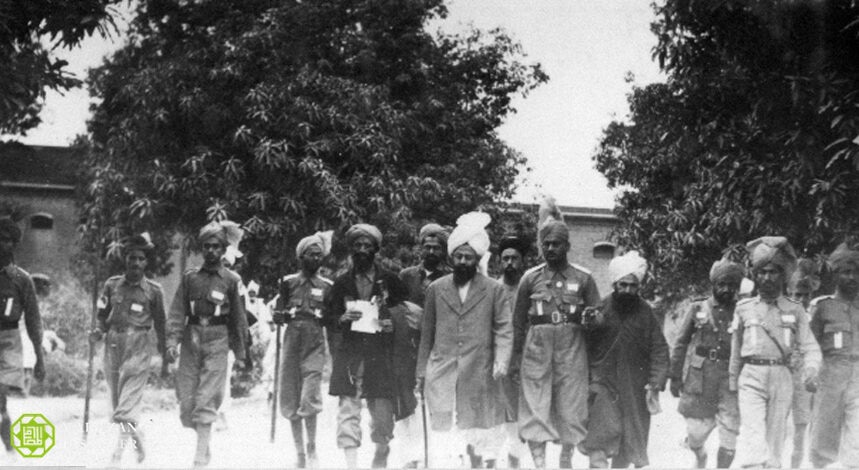
Treaty of Darin
In 1915, the ruler of Nejd signed the Treaty of Darin with the British government, which meant that he would not hinder any military operations against the Muslim states of the region. In return he was granted weapons and financial aid.
Sharif Hussein Ibn Ali of the Hedjaz was also granted financial aid on the condition of assisting the British against the Ottomans. It not only threatened the autonomy of these two Arab states, but also initiated their conflict with the other Muslim states.
Therefore, Hazrat Musleh-e-Maudra wrote to Lord Chelmsford, the Viceroy of India, that such grants to the Hedjaz and Nejd would lead to an uprising from other Muslim states and Muslims would never tolerate the suzerainty of the British government on Arab lands.
Turkey’s misery
A few years later, when World War I ended, Turkey was in a miserable state. In such a time, a pan-Islamic force in India arose in 1919, in an effort to salvage the Ottoman Caliph as a symbol of unity among the Indian Muslims. It is known as the Khilafat Movement. Fears of Muslim disunity were aroused by the decline of the Ottoman Empire – the preeminent Islamic power whose Sultan, as Caliph, was seen by pan-Islamists as the leader of the worldwide Muslim community.
On 21 September 1919, an All India Muslim Conference was held, to which Hazrat Musleh-e-Maudra was also invited, but he could not attend. So, he sent a detailed article, titled Turkey ka Mustaqbil aur Musalmanon ka Farz, which was published in Al Fazl, 27 September 1919.
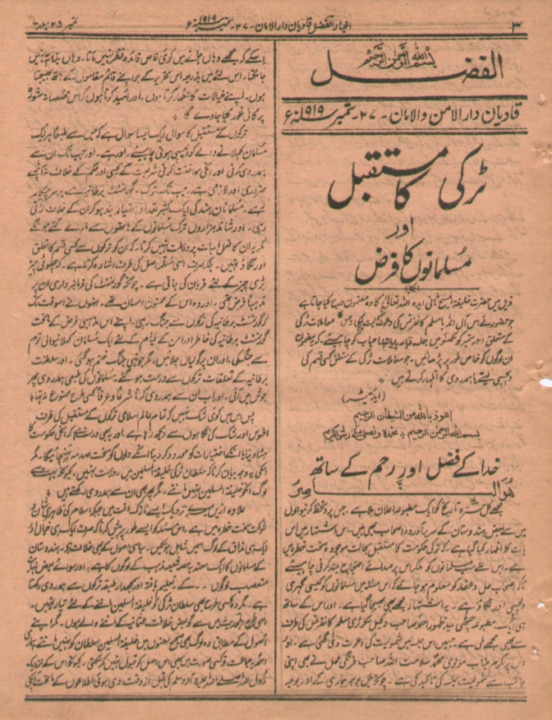
This article was later translated into English as The Future of Turkey and published in The Moslem World, Vol. 10, pp. 274-281.
Huzoorra stated:
“The question of the future of Turkey can not fail to possess an interest for every one who calls himself a Mussalman. This is at once natural and a fact. And so long as such sympathy and friendliness do not conflict with the commands of religion, such a sentiment is both a duty and a necessity. […]
“There is no doubt that the whole Islamic world has been looking upon the future of the Turks with doubt and misgivings and there is no doubt that the complete extinction of the empire or any curtailment of its independence will deeply wound the Moslem feeling.” (The Moslem World, Vol. 10, p. 274)
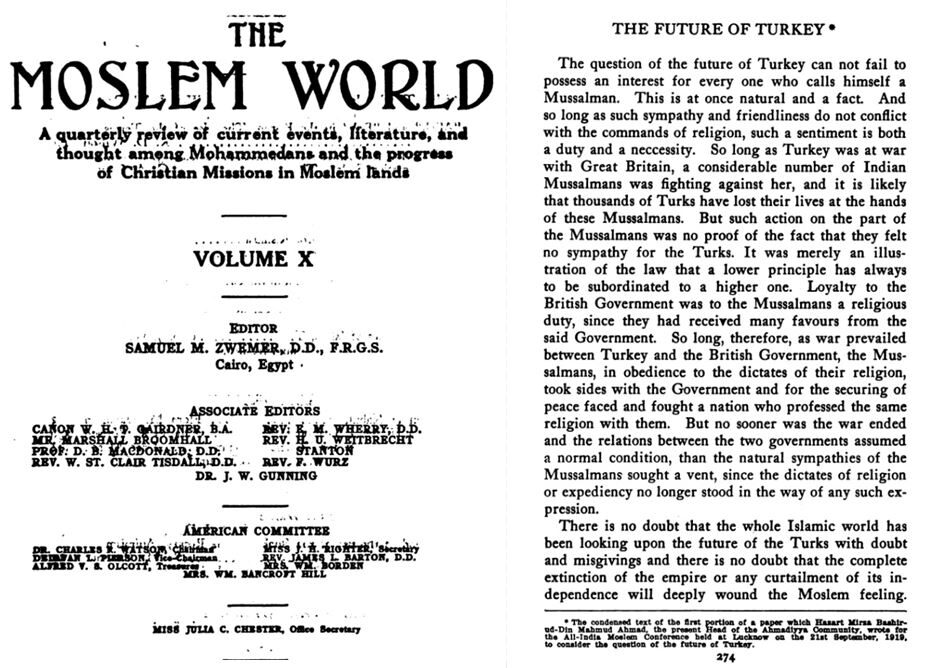
Huzoorra also suggested to the Muslims a scheme to protect Turkey from the upcoming dangers.
The following year, the Indian Muslims decided to hold a conference about Turkey’s issue, on 1 and 2 June 1920 in Allahabad. Upon the request of Maulvi Abdul Bari Sahib Farangi Mahali, Hazrat Musleh-e-Maudra wrote an article, titled “The Agreement of Turkey and Muslims’ Future Plan”.
Huzoorra stated that the Muslims were presenting many suggestions, including migration, jihad-e-am [open warfare] and civil disobedience etc., but all these suggestions were invalid and inapplicable. He advised the Muslims to devise a practical plan. (Al Fazl, 7 June 1920, pp. 3-8)
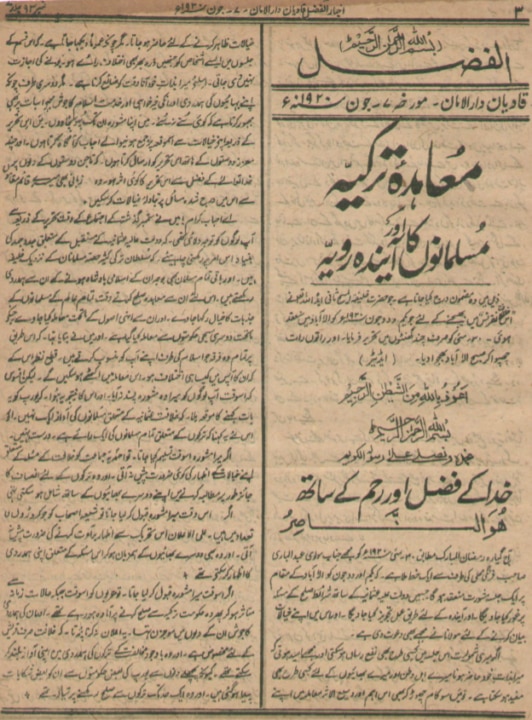
The Civil and Military Gazette reported:
“In his letter, addressed to the members of the Khilafat conference which met at Allahabad in June last, a printed copy of which has been sent to us, Mirza Basheer-ud-Din Mahmud, Khalifat-ul-Masih II, head of the Ahmadiyya community, presents the Khilafat question in its practical aspects. A zealous Mahomedan, imbued with all the ardour of his faith, and a stout champion of the rights of Turkey, Mirza Basheer-ud-Din criticises the Turkish Peace terms in several well-reasoned pages; but he does not allow his feelings to overpower his commonsense and self-respect. […] While extremists sought suicidal relief for their grievances, this advocate of moderation propounds a practical remedy in the formation of a ‘League of Islam’ to protect Mahomedan interests all over the world by constitutional means. While this suggestion will give his co-religionists ample scope for the ventilation of their case, it is at the same time an opportune moment for all those who have been perturbed by the present fanatical agitation to study closely Mirza Basheer-ud-Din’s arguments against Hijrat and non-co-operation.” (The Civil and Military Gazette, 30 July 1920, p. 6)

Address to Lord Reading
Huzoorra not only guided the Muslims on the issue of Turkey, but also called the attention of the British government towards this issue and the Hedjaz as well. He sent a delegation of Ahmadis to present an address to Lord Reading, Viceroy of India, on 23 June 1921.
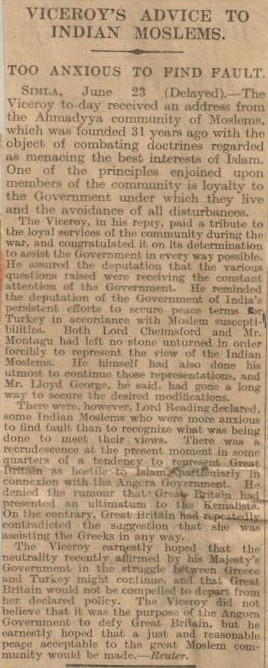
The address mentioned the issue of Turkey and advocated the autonomy of the Hedjaz and the greater interests of the Muslims:
“Notwithstanding that we do not acknowledge the Sultan of Turkey as the Khalifa of the Muslims and have thereby exposed ourselves to the reproaches of our fellow countrymen, we fully sympathise with the Turkish government in its affliction, for we feel that Turkey has not received fair treatment; and as it is a wrong which can be righted at any time, there is no reason why the Indian government should give up its efforts to secure a fair treatment for Turkey. If, after a lapse of fifty years, Alsace Lorraine could be restored to France through the efforts of the British government, the provinces of Smyrna and Thrace where the Turkish population certainly preponderates, may similarly be restored to Turkey in spite of the present settlement.
“But more important still, in our opinion is the question of the independence of Hedjaz, which must remain free from outside interference.
“When this question arose every Muslim entertained the misgiving that the freeing of Hedjaz from Turkish control might mean the bringing of it under the control of a European power. Hedjaz being a sterile country would, it was feared, be unable to produce sufficient income to defray the expenses of its administration and the Hedjaz government would be compelled to borrow money from a foreign country, thus placing itself under the control of a European power.” (The Review of Religions, June 1921)
The Viceroy replied to the address, which, according to The Leader of Allahabad, was seen to have touched upon “some of the burning issues of the day”. (“Viceroy’s Reply to the Ahmadiyya Community”, The Leader, 26 June 1921)
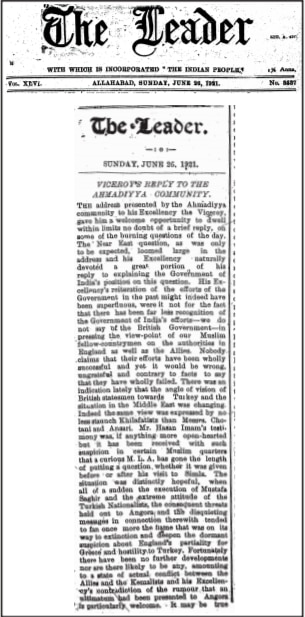
A detailed report was published in The Pioneer Mail and Indian Weekly News on 30 June 1921.
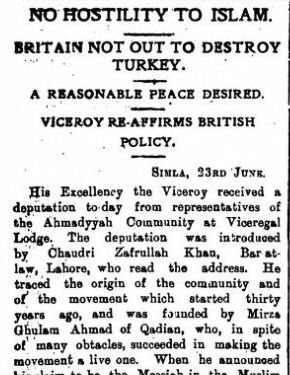
Syria’s Freedom Movement
Then comes the issue of Syria, which was occupied by France post-World War I and took France three years – from 1920 to 1923 – to gain full control over. Though many insurgencies broke out from time to time, but the freedom movement started in 1925.
Then, between 18 and 21 October 1925, Damascus was heavily attacked for more than 57 hours.
During his Friday Sermon of 13 November 1925, after narrating the Promised Messiah’sas revelation “Balaa-e-Dimashq” (Calamity of Damascus), Hazrat Musleh-e-Maudra stated:
“This is an act of great oppression upon the people of Damascus, who were already helpless. […] In my view, it is the Syrians’ right to get independence. It is their own country, so their leaders should also be their own. […]
“They are being oppressed and I have sympathy for those oppressed people. […] I also pray for those who strived and got killed for the freedom and independence of the nation. I also pray for those who are alive and striving for this cause, that may they be saved from destruction and be successful.
“As it is our duty to have sympathy for everyone, I also pray for the European people that may Allah open their eyes, so they may do justice, avoid oppression and establish freedom and independence instead of suppressing it.” (Al Fazl, 21 November 1925, pp. 8-10)
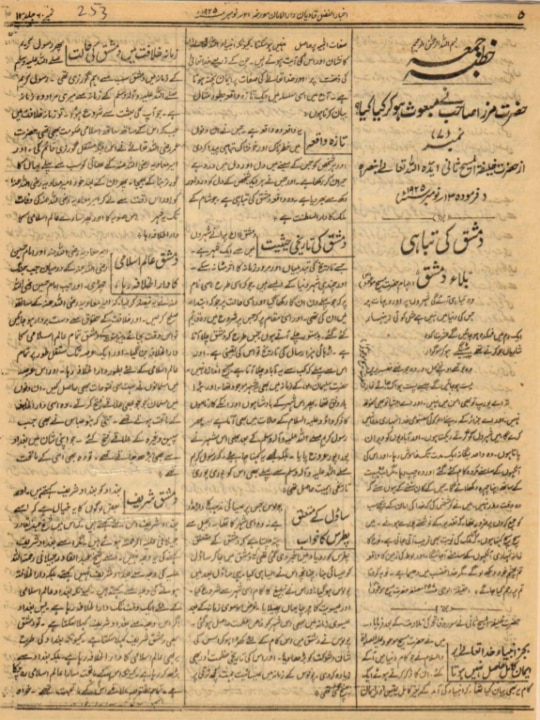
The early years of the Kashmir Movement
Hazrat Musleh-e-Maudra was desirous of the freedom of Kashmir’s oppressed Muslims. His efforts for the rights of the Kashmiri Muslims were highly commended by prominent Muslim leaders of the time. On one hand, Huzoorra was advocating the rights of Kashmiri Muslims through peaceful methods, but on the other, Majlis-e-Ahrar was damaging the cause through violent and unlawful actions. The details of this whole episode can be found in our article, titled “Historical analysis of Ahrar’s anti-Ahmadiyya agitation”, published in three parts.
Hazrat Musleh-e-Maudra wrote an article, titled The Condition of Muslims in Kashmir and Jammu State, outlining the importance of Kashmir and the demands of Kashmiri Muslims. He added that the issue of Kashmir could be solved if all the Muslims strived with unity. (Al Fazl, 16 June 1931, pp. 3-4)
A famous leader of the Freedom Movement, Mufti Ziauddin Sahib, wrote in his Persian poetic booklet that in the beginning of the Freedom Movement, many letters were sent to the prominent leaders of India, including Allama Iqbal, Sheikh Sadiq Hasan, Khawaja Hasan Nizami and Hazrat Musleh-e-Maudra, who were all requested to offer their help. All of them, excluding Hazrat Musleh-e-Maudra, responded by asking why he had got involved in such a dangerous act. Huzoorra, however, sent a heavy amount for this cause. (Noha-e-Kashmir, pp. 12-13, published by Punjab National Press Lahore in 1963)
On 13 July 1931, dozens of Kashmiri Muslims were killed and many suffered severe injuries as a result of the inhumane treatment by the local police. Upon this, Hazrat Musleh-e-Maudra sent a telegram to the Viceroy of India, notifying him of the situation, and informed him of the details as to how the Muslims of Kashmir were being oppressed. (Al Fazl, 18 July 1931, pp. 1 & 12)
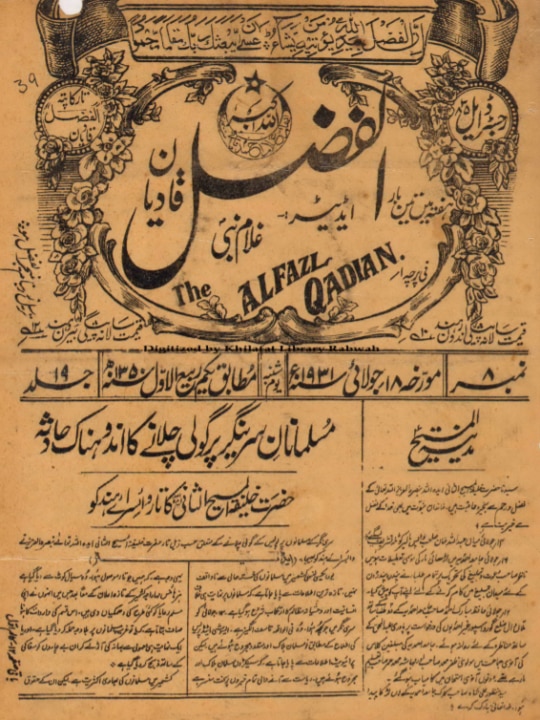
In regard to the reaction from the Muslim leaders, Suhail-ul-Rehman Lone states:
“Barely a week after the July 13 massacre, several leaders […] laid the foundation of the Kashmir Committee (subsequently known as the All India Kashmir Committee) in Simla which aimed at speaking on the behalf of Kashmiri Muslims. The founding members of the Committee included Fazl Hussain, Khawaja Hassan Nizami, Mirza Bashir-ud-Din […]. The members chose Mirza Bashir-ud-Din as the president of the Committee and his personal assistant, Moulvi Abdul Rahim Dard as the Secretary. Immediately after its formation it began to pressurize the Maharaja and the Government of India to appoint an enquiry committee in order to bring forth the facts about the central jail incident. It decided to celebrate the Kashmir Day on August 14.” (Indian National Movement And The Freedom Struggle Of Jammu And Kashmir [1931-1947 A.D.], pp. 63-64)
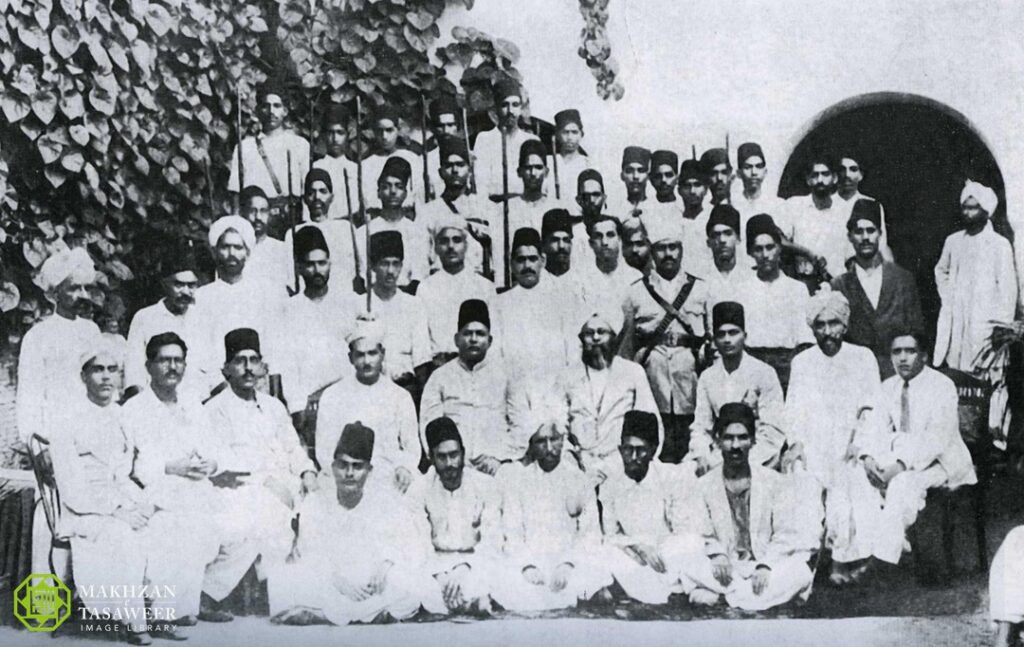
Ravinderjit Kaur, in her book, Political Awakening In Kashmir, has also stated details of the early days and activities of this committee. She wrote:
“The All India Kashmir Committee was formed on July 25, 1931 at Simla. The members of this Committee were: Sir Sheikh Mohammad Iqbal, Nawab Sir Zulfiqar Ali Khan, Khawaja Hassan Nizami, Nawab Ibrahim Ali Khan of Khanjpura, Mirza Bashir-ud-Din Mahmood Ahmad, the President of the Committee […] and Maulvi Abdur Rahim Dard who was the Secretary of the Committee.
“The dynamic forces behind the Kashmir Committee were Sheikh Mohammad Iqbal and Mirza Bashir-ud-Din Mahmood Ahmad.” (Political Awakening In Kashmir, p. 156)
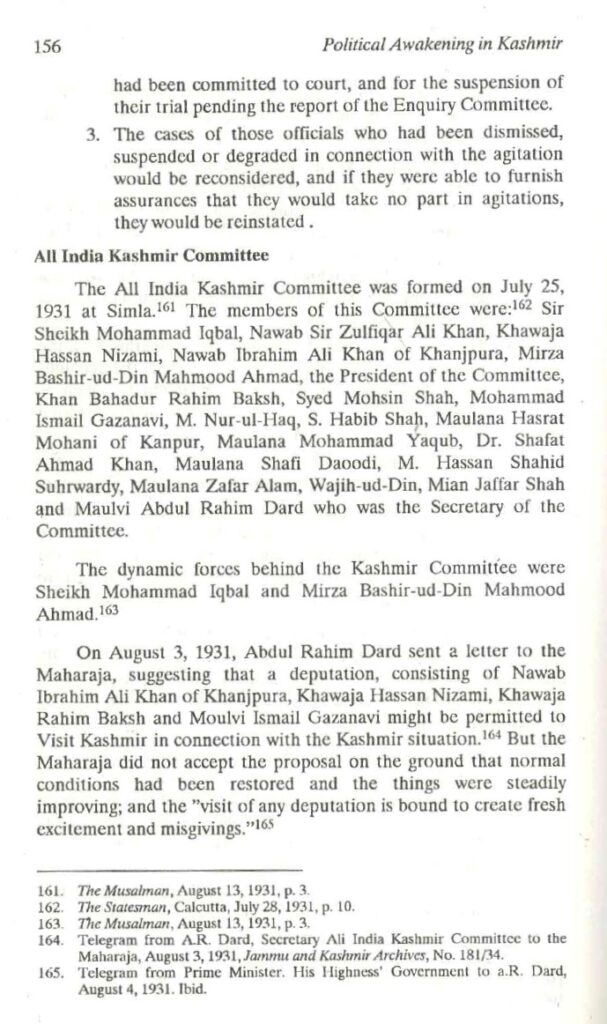
Muhammad Yusuf Ganai states:
“Mirza Bashir-ud-Din Mahmud Ahmad, Amir of the Jamat-i-Ahmadiya took initiative in convening a meeting of some leading Muslims at Simla on 25 July 1931 to consider the situation. It was in this historical meeting that the foundation of All India Kashmir Committee was laid.” (Kashmir’s Struggle For Independence (1931-1939), p. 95)
C. Bilqees Taseer states:
“After the July 1931 riots, it was at the request of Dr. Iqbal – who knew that he and the members of his organisation would have a considerable number of disciplined volunteers and adequate funds at their disposal – that Mirza Bashiruddin Mahmud Ahmed[ra] took the initiative in organising the work of the All India Kashmir Committee, starting from 1931. At Garhi Habibullah Rest House a meeting was arranged between Mirza Bashiruddin[ra] and Sheikh Abdullah in which it was decided that the latter should be the leader of the movement and Chaudhry Ghulam Abbas Khan, Secretary. Funds were collected from all over India for the Kashmir cause.
“The Committee was formed as a result of a meeting held at Fair View, Simla on July 25th, 1931, sponsored by Dr. Iqbal, at Which Mirza Bashiruddin Mahmud Ahmed[ra] presided. The All India Kashmir Committee was formed with eminent persons from all over India. Moulvi Abdur Rahim represented the Kashmir Valley and Allah Rakhar Saghar represented Jammu province.” (The Kashmir of Sheikh Muhammad Abdullah, Ferozsons Pvt. Ltd, Lahore, 1986, pp. 9-10)
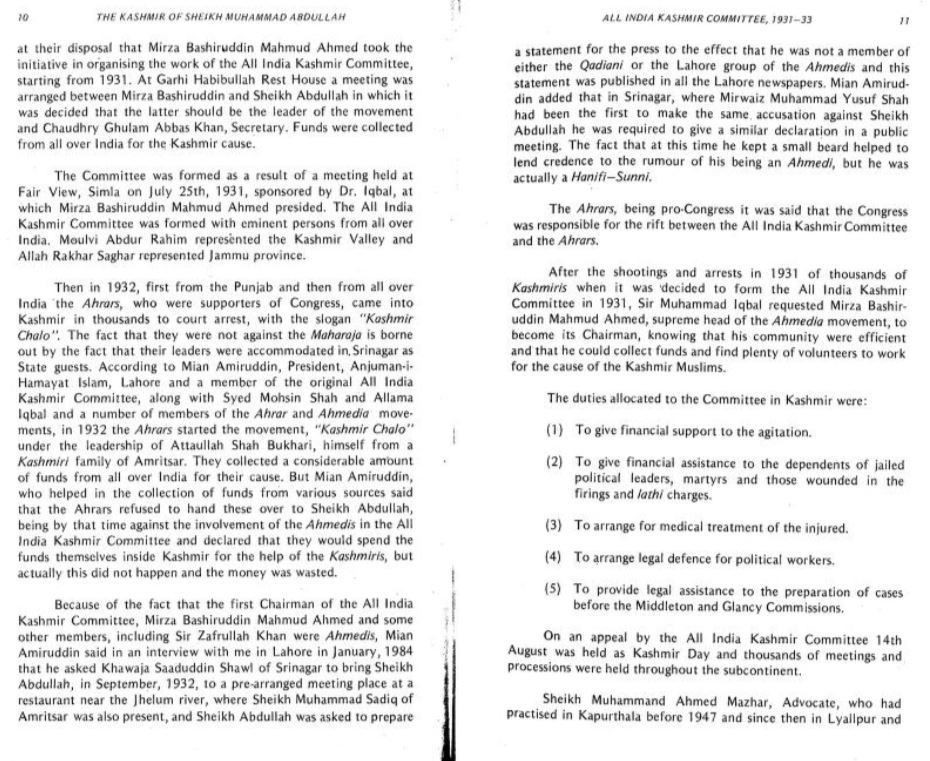
In June and July 1931, Huzoorra wrote detailed articles in regard to the Kashmir Movement and gave valuable guidance to the Muslim leaders. He also wrote many special messages and letters addressed to the Muslims of Kashmir, which greatly uplifted them and created a new passion for freedom.
As the All India Kashmir Committee had given a call for observing Kashmir Day on 14 August 1931, Huzoorra wrote an article on 6 August 1931, in which he advised all to celebrate Kashmir Day with full zeal and passion.
“In response to a call given by the All India Kashmir Committee, Kashmir Day was observed on August 14, 1931 with tremendous enthusiasm both within and outside the State.” (Kashmir’s Struggle For Independence (1931-1939), p. 96)
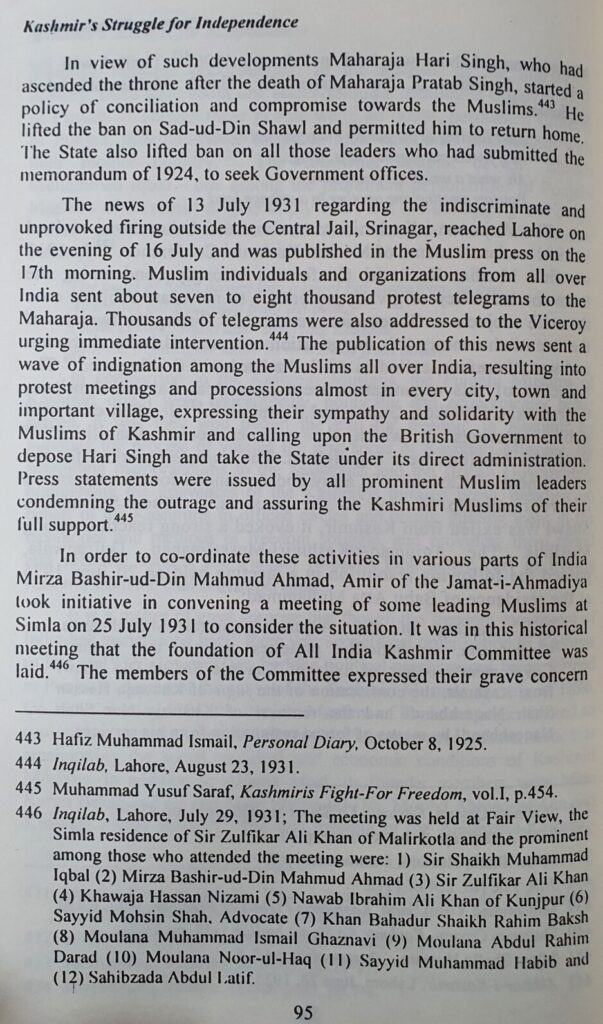
On 26 September 1931, Hazrat Musleh-e-Maudra was interviewed regarding the latest occurrences in Srinagar, in which he “expressed regret at the mass of anti-Muslim propaganda which was being issued.” He further said:
“Unwarranted bloodshed and indiscriminate arrests of Muslim leaders have considerably changed the situation. If the imprisoned leaders are at once released, representatives of Kashmir Muslims, I hope, will spare no pains to create an atmosphere of peace.” (The Civil and Military Gazette, 28 September 1931, p. 7)
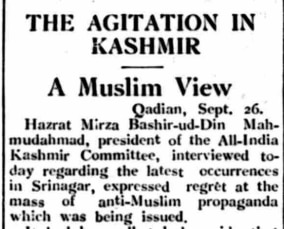
Another meeting of the Committee was held on 13 October 1931:
“ALL-INDIA KASHMIR COMMITTEE
“Efforts to be Redoubled
“MEETING IN LAHORE
“An emergency meeting of the All-India Kashmir Committee was held in Lahore on Tuesday, the President, Mirza Bashir-ud-din Mahmood Ahmad Sahib, being in the chair. […] Sir Zulfiqar Ali Khan reiterated on behalf of the Committee, the complete confidence of members in the President and praised his services in the cause of Kashmir Muslims.” (The Civil and Military Gazette, 16 October 1931, p. 6)
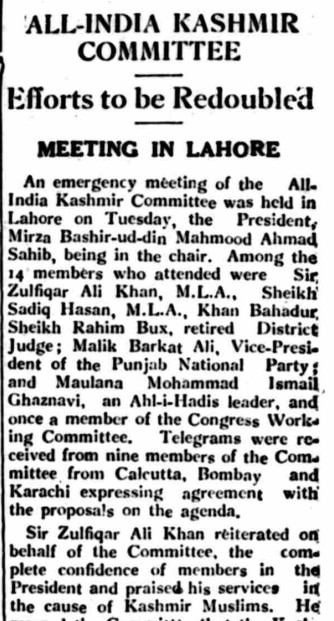
In another meeting on 24 October 1931, the ongoing situation of Kashmir was discussed:
“Muslim Demands in Kashmir
“Independent Riots Inquiry Proposed
“(From A Correspondent)
“An emergency meeting of the All-India Kashmir Committee was held at Lahore, on Saturday, to consider the situation arising out of the reply given by the Maharaja of Kashmir to the Muslim demands presented on October 19. Mirza Bashir-ud-Din Mahmood Ahmad presided.
“The following resolutions were passed:
“‘That this meeting agrees with the Kashmir Muslims that the findings of the Dalal Commission are one-sided, incomplete, unsatisfactory and unacceptable.
“‘That the meeting disapproves of the appointment of the new Dalal Commission which will also not inspire confidence. Sir B Dalal has already formed his opinion and besides his findings will prejudice the court in the trial of political cases, as he is also the head of the State judiciary.
“‘That an absolutely independent Commission should be appointed to inquire into the history of the disturbances. This Commission should include a majority of non-official Muslim members appointed after consulting Kashmir Muslim representatives.
“Reforms
“‘That the proposed Commission on constitutional questions should also have a majority of non-official Muslim members, acceptable to and enjoying the full confidence of Kashmir Muslims, and its terms of reference should be settled after consulting them.
“‘That in order to create a better atmosphere for the Inquiry Commission the State should suspend the trial of cases arising out of the disturbances, pending the report of the Commission.
“‘That the Kashmir Government should immediately make a declaration granting the elementary rights demanded in the Muslim memorial, as there is absolutely no justification for their postponement.’” (The Civil and Military Gazette, 28 October 1931, p. 11)

Hazrat Musleh-e-Maudra initiated a scholarship fund for Kashmiri Muslim students and also established the Kashmir Relief Fund for helping the oppressed Muslims of Kashmir.
In regard to this, Adil Hussain Khan states:
“On May 23, 1932, Mirza Mahmud Ahmad — this time on behalf of Jama’at-i Ahmadiyya — established a new scholarship fund for Muslim students studying in Kashmir […] Mahmud Ahmad appropriated funds to the Kashmiri cause from every accessible channel including Jama’at-i Ahmadiyya. As Khalifat al-masih II, he established the Kashmir Relief Fund, a mandatory charitable donation (chanda) levied upon each wage-earning Ahmadi within his Jama’at.” (From Sufism to Ahmadiyya: A Muslim Minority Movement in South Asia, published by Indiana University Press, p. 102)
In mid-1932, when Sheikh Muhammad Abdullah and other Kashmiri leaders were facing imprisonment, Huzoorra cautioned the Kashmiri people by stating that if their leaders did not get freed soon and meanwhile, the Assembly’s elections were held, it would be their duty to nominate those contestants who had an interest in the national cause. Huzoorra advised not to boycott the elections.
Though Sheikh Abdullah Sahib was freed, still many leaders were in prison, so he thought about compromising with the state. Huzoorra, however, emphasised upon contesting the elections. So, the “Muslim Conference” nominated its contestants and all of them won.
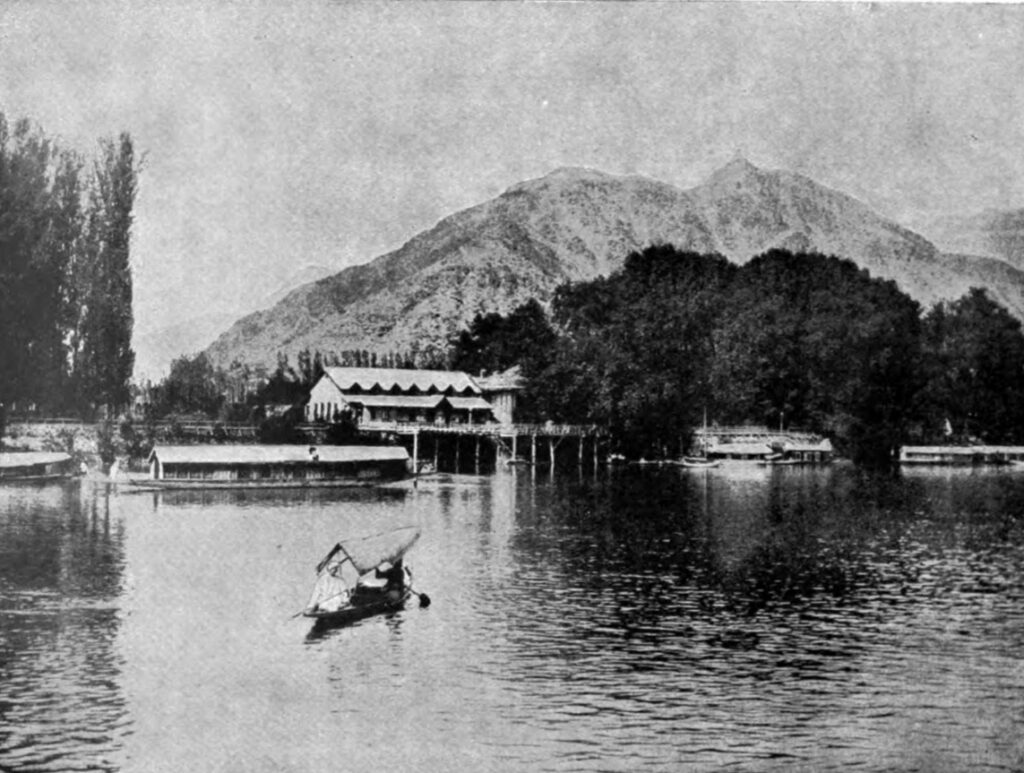
While the Kashmir Movement was achieving great success, the opponents of Jamaat-e-Ahmadiyya started a campaign against Huzoorra, without thinking about the interest of the Kashmiri Muslims, and demanded that the president of the All India Kashmir Committee should not be an Ahmadi.
Observing this situation, Huzoorra called a session of the Kashmir Committee on 7 May 1933 and during the meeting, resigned from the presidency. This was a big loss to the Kashmir cause, but Huzoorra did not stop his efforts for the Kashmiri Muslims.
The Civil and Military Gazette reported that a meeting of the All-India Kashmir Committee was held on 7 May 1933 at the Cecil Hotel, Lahore, presided over by Hazrat Musleh-e-Maudra.
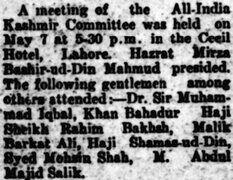
During this meeting, a resolution was passed, in which it was stated:
“This meeting deems it its duty to place on record its genuine and sincere appreciation of the valuable and sincere services rendered by Hazrat Mirza Bashir-ud-Din Sahib Mahmud to the cause of Kashmiri Mussalmans.
“That in view of the fact that Mirza Bashir-ud-Din Mahmud has volunteered to resign the Presidentship of the Kashmir Committee, this Committee regretfully accepts that resignation.” (The Civil and Military Gazette, 16 May 1933, p. 8)
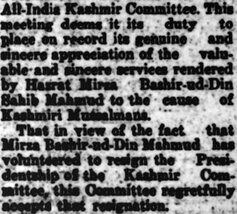
A Muslim Political Correspondent of The Civil and Military Gazette wrote:
“It is, I think, a matter of regret that Mirza Bashir-ud-Din Mahmud Ahmad should have retired, as I understand he has, from the Presidentship of the Kashmir Committee, where his counsels were always those of moderation and prudence. Quietly, but nonetheless with determination, he fought the battle of the Muslims of Kashmir. It was due to his efforts very largely that the important right of peasant proprietorship was conceded to the Muslim agriculturists of Kashmir and Jammu, that lawyers were sent who defended something like two thousand cases arising out of the riots free of charge—and, I think, not least important of all—he combatted the mischievous Ahrar influence.” (The Civil and Military Gazette, 15 May 1933, p. 3)
A newspaper, Siasat, wrote on 18 May 1933:
“At the time, when the condition of Kashmir was critical, those who chose Hazrat Mirza Sahib, despite doctrinal differences, made a perfect choice. Had they not chosen Mirza Sahib because of the differences in their beliefs, this movement would have ended in utter failure and would have resulted in a major loss for the Muslim Ummah.”
Sheikh Abdul Hamid Sahib, Advocate Jammu stated that the Muslims of Kashmir succeeded in getting their rights to an extent, with the help of the great services of Huzoorra, his Jamaat members and the Kashmir Committee. (Tarikh-e-Ahmadiyyat, Vol. 5, p. 656)
Following Huzoor’sra resignation, the new president, Allama Iqbal, also resigned on 18 June 1933, by stating that the Ahmadi members of the committee would not be loyal to anyone other than their imam (Huzoorra).
Then, Allama Iqbal suggested his close friends to hold a public jalsa [gathering], which was then held in Lahore on 2 July 1933. The dissolution of the old committee was announced there and a new committee was formed, which also could not last long.
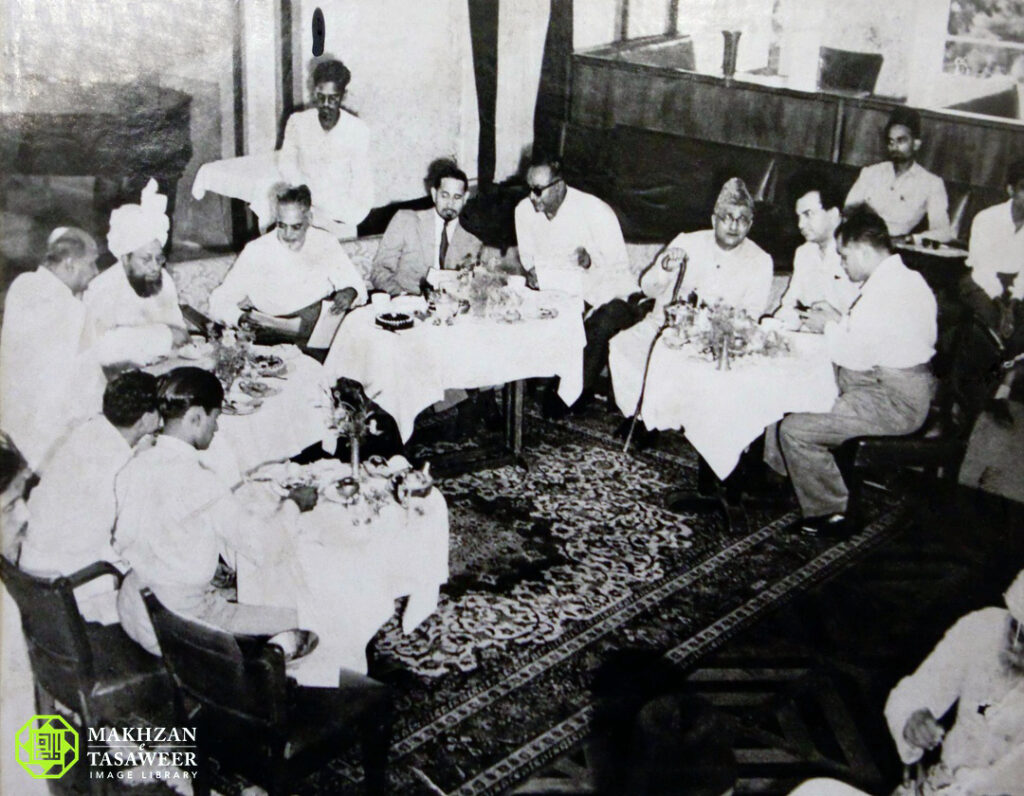
Then, on 3 September 1933, some prominent leaders had a meeting in Lahore – chaired by Hazrat Musleh-e-Maudra – in which keeping the unity intact was discussed. It was decided to revive the old committee and for the presidency to be offered to Allama Iqbal, but he refused.
So, a new committee, namely “All India Kashmir Association” was formed under the presidency of Syed Habib Sahib, Editor Siasat, which had 45 members, including Huzoorra. Its activities started on 28 March 1934 and it continued work for nearly four years, striving hard for the Kashmir cause.
On 5 April 1934, a statement from the All-India Kashmir Association was published, in which it was stated:
“It is an undeniable fact that the A.I. Kashmir Committee has done meritorious work in aid of the Kashmir sufferers under the Presidentship of Mirza Bashir-ud-Din Mahmud Ahmad Sahib for over two years. This work has been appreciated by all sections of thought.” (The Civil and Military Gazette, 6 April 1934, p. 6)

The statement also mentioned a meeting which was held on 28 March, and Hazrat Musleh-e-Maudra was also present there. The following resolutions were passed during the meeting:
“(1) That the All-India Kashmir Committee should continue its work regarding Kashmir.
“(2) That henceforth the Committee shall be known as the All-India Kashmir Association to avoid confusion with the committee under the presidentship of Dr Sir Muhammad Iqbal.
“(3) That provisionally Syed Habib Sahib shall be President and M. Mohd. Din Sahib Fauq shall be the Secretary of the Association.” (Ibid)
Huzoorra continued his efforts for the betterment of the Kashmiri Muslims. Mentioning a meeting of the All-India Kashmir Association, held on 29 April 1936, The Civil and Military Gazette reported that Hazrat Musleh-e-Maudra was also present there. (The Civil and Military Gazette, 2 May 1936, p. 4)
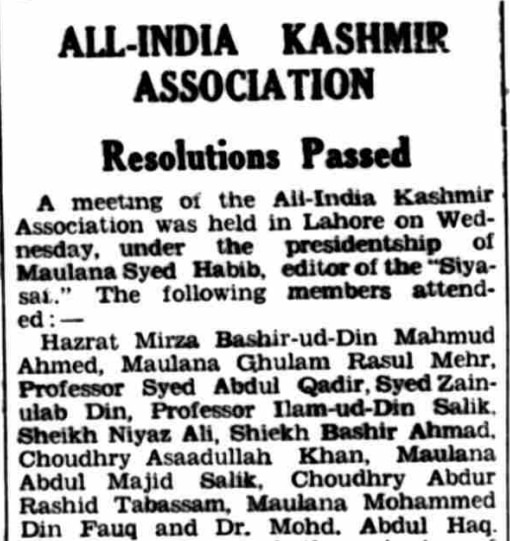
Abdul Majid Salik Sahib writes:
“Sheikh Muhammad Abdullah (Sher-i-Kashmir) and other workers used to keep open contact with Mirza Mahmud Ahmad Sahib and some of his workers. […] The only reason for their contact was the fact that Mirza Sahib had many resources and he was helping the Kashmir Movement in many respects and workers of Kashmir Movement were naturally obliged to him.” (Zikr-e-lqbal, p. 188)
London Conference of 1939 on the Palestine issue
From 7 February to 17 March 1939, the British government organised a conference of the Arab countries in relation to the issue of Palestine. At that time, Maulana Jalaluddin Shams Sahib invited the viceroy of Mecca and representatives of Palestine, Iraq and Yemen at a party, in which 200 guests participated, including many dignitaries.
Hazrat Musleh-e-Maudra sent a message through telegram, which was read out in both English and Arabic. Huzoorra stated:
“Welcome his Royal Highness the Amir Faisal and the Palestine Conference delegates, on my behalf, and tell them that the community is completely with them, and prays that God may give them success and may help all Arab States on the path of prosperity and give them the leadership of the Muslim world—the leadership which they possessed in the early centuries of Islam.”
For more details, see “Ahmadiyya advocacy for Palestinian rights: A historical examination of Arab-Jewish tensions in 1939”, www.alhakam.org.
The chaos in Iraq
During World War II, Iraq had to face a new issue when Sheikh Rashid Ali al-Gaylani and like-minded people initiated chaos in the country, which endangered the sacred places of the Muslim world. At that juncture, on 25 May 1941, Huzoorra delivered a speech, titled Comments on Iraq’s Situation on the All India Radio Station Lahore.
The Civil and Military Gazette announced under the heading “Broadcast on Iraq”:
“Hazrat Mirza Bashir-ud-Din Mahmood Ahmed of Qadian will broadcast a talk in Hindustani on ‘Iraq’ from All India Radio, Lahore, on Sunday, May 25, at 8:50 pm.” (The Civil and Military Gazette, 25 May 1941, p. 10)

Mentioning this speech, The Indian Listener (English Programme Journal of All India Radio) wrote:
“Among those who spoke on the various aspects of the Iraq problem were Hazrat Mirza Bashiruddin Mahmud Ahmad, Amir Jamaat-i-Ahmadya, Sir Abdul Qadir, Sir Sultan Chinoy […].” (The Indian Listener, 22 June 1941, p. 13)

Huzoorra stated:
“The present unfortunate rising in Iraq is naturally causing deep anxiety to Muslims all over the world, including the Muslims in India. […] Iraq contains the sacred places of both the Sunni and the Shi‘ah Muslims; moreover this country is situated in the very heart of the Muslim world, its prosperity and peace therefore is the heart’s desire of every Muslim. But this dear land now lies exposed to the horrors of a war of which the devastation in other lands wrung our hearts even when there was no special tie between us and its victims. In the face of this peril the Muslims cannot remain silent; and, indeed, they are not silent over it. All over the world they are giving expression to the deep anxiety knawing at their hearts, and their apprehensions over this unfortunate situation are fully justified. […]
“In consequence of this revolt Turkey has been encircled; the war has been brought to the very door-steps of Iran; and as for Syria that country now lies in the direct line of the conflict; Iraq has become the epicentre of the war; while, at the rate the storm moves, Afghanistan is not far out of its reach. The greatest danger, thus, lies in the fact that the furies of war are now hovering on the very borders of places which to us are dearer far than our own native lands, our lives and our honour. Our sacred places which are guarded by no ramparts – which, as far as material means are concerned, have no defence at all, are now fully exposed to the danger. Those slender walls to which cling our hearts with inexpressible love, no matter where we are, now lie in the reach of dive-bombers and high explosive missiles of which a single hit can shatter rock-like fortifications to the ground.
“All this has come to pass through a mistake on part of a few of our own brothers; for, before the trouble broke out in Iraq the war front was hundreds of miles away from these places. In these circumstances it is the duty of each single Muslim to try to nip the mischief while it is still in the bud. […] In this crisis the Muslims everywhere should unite in working for the speedy restoration of peace in Iraq. […] This is the only way to keep the flames of war at a distance from Mecca and Medina, from Turkey, Syria, Iraq and Afghanistan. […] At the end of this war the question should be settled not only of the independence of Czechoslovakia and Poland, but of the Arab lands as well. Justice demands it.” (The Review of Religions, Vol. 40, June 1941, pp. 218-223 [Edited by Al Hakam])

WWII and a threat to the Hedjaz
During the Second World War, the Middle East was under severe pressure and there was a big threat to the sacred land of the Hedjaz. At that critical juncture, in his Friday Sermon of 26 June 1942, Huzoorra stated:
“Now the war has reached such a dangerous point that Islam’s sacred places have become vulnerable. No matter how much we disagree with the belief of Egyptians, no matter how much we disagree with their justification and interpretation of Islam, we cannot deny that they are the followers of our God, our Rasul [the Holy Prophetsa] and our book [the Holy Quran]. […] So, Egypt’s suffering and destruction should bring grief to every Muslim, no matter which sect they belong to, and regardless of how much they disagree with the Egyptians. Moreover, from Egypt, that Holy Land begins whose each and every particle is beloved to us more than our lives. Hence, though Allah the Almighty has promised to protect those places, it does not free the Muslims from their responsibility in relation to their protection, but rather, it is essential for every true Muslim to make utmost efforts to protect them.” (Al Fazl, 3 July 1942, pp. 2-4)
The newspaper, Zamzam, on 19 July 1942, wrote:
“Under the current circumstances, the Khalifa Sahib has shown such righteous indignation for Islam with reference to Egypt and the Holy Land of the Hedjaz that we are greatly indebted to him, and by expressing his concern, he has rightly represented the feelings of Muslims.”
All Jammu and Kashmir Welfare Association
In 1944, under the guidance of Huzoorra, the All Jammu and Kashmir Welfare Association was established for uniting Muslims and conveying their voice to the government.
A delicate time for the Muslim World and establishment of Israel
Hazrat Musleh-e-Maudra saw a vision, in which he was foretold by Allah that a delicate time was coming for Islam and Muslims needed to unite for tackling that issue. Huzoorra wrote an article, titled Al-Inzaar (The Warning), wherein he stated his vision in detail and advised the Muslims in regard to this. (Al Fazl, 28 August 1946)
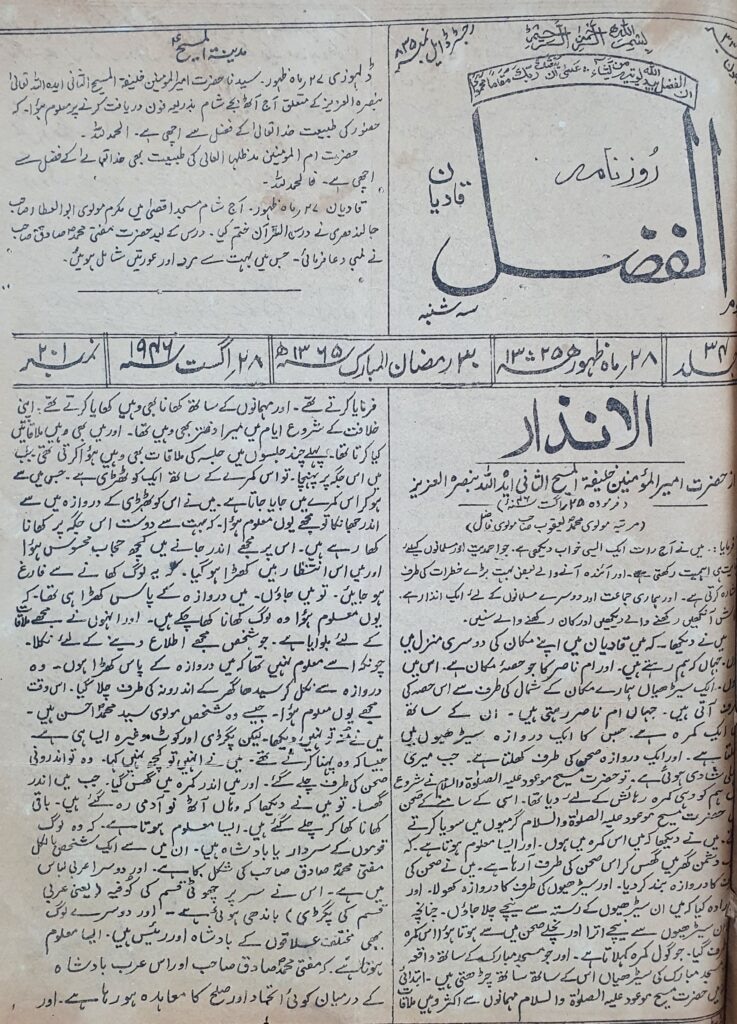
During his Friday Sermon of 30 August 1946, Huzoorra instructed the Jamaat to specially pray for the Muslim World.
Two years later, when Israel was established on 14 May 1948, the conspiracies regarding Palestine emerged openly and at that time, Hazrat Musleh-e-Maudra tried to awaken the Muslim Ummah. Huzoorra wrote a masterpiece, titled Al-Kufru Millatun Wahidah (kufr is a nation united) and called on all Muslims to unite as one to deal with that issue.
Huzoorra stated:
“The day which was prophesied by the Holy Quran and ahadith hundreds of years ago; the day which was prophesied in the Torah and Gospels; the day which was told to be painful and dangerous for the Muslims has seemingly arrived. Jews are being inhabited in Palestine.
“America and Russia […] seem to be on the same page. And strangely, they both were united on the Kashmir issue as well. […] It is strange that the disputes of Palestine and Kashmir have emerged at the same time. […]
“So, I draw the Muslims’ attention towards this matter that they should understand this delicate time and remember that today, the saying of the Holy Prophetsa:
اَلْكُفْرُ مِلَّةٌ وَّاحِدَةٌ
“[kufr is one nation] is being fulfilled to the letter.” (Al Fazl, 21 May 1948, pp. 3-4)
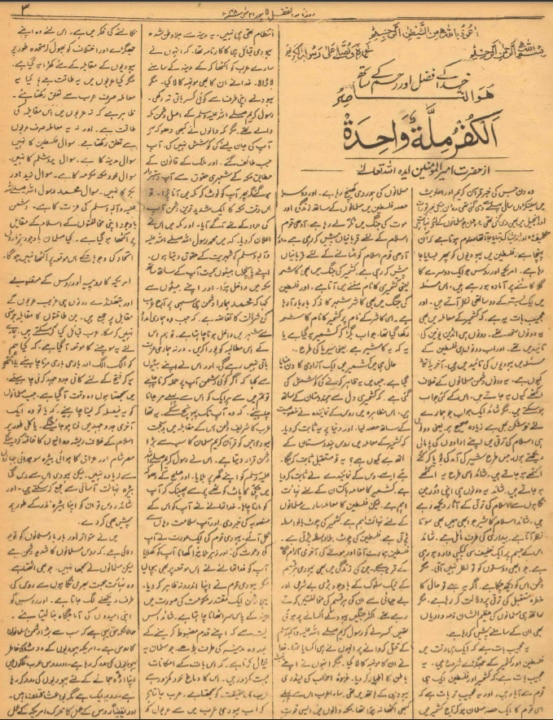
This article had a great impact in Syria, Lebanon, Jordan and other Arab countries. Syrian radio stations aired its summary and many Arabic newspapers published its excerpts, including Al-Yaum, Al-Akhbar, Al-Nasr and Al-Urdan.
For more details, see “The Ahmadiyya Khilafat’s call for Muslim unity: The solution to Israel-Palestine issue”, www.alhakam.org.
On 12 December 1948, Hazrat Musleh-e-Maudra delivered a lecture at the Law College Lahore, titled “Maujooda Halaat mein Aalam-e-Islam ki Haisiyyat aur uska Mustaqbil” – The Status and Future of the Islamic World in light of the current situation. Huzoorra stated:
“In my view, the Islamic world’s future is completely safe, provided we [Muslims] act upon those means of success which the Holy Quran has prescribed for us.”
Narrating those means of success, Huzoorra outlined various proposals, which included:
(1) If European powers themselves acknowledge the Islamic world as a separate entity whenever they are faced with any issue regarding Muslim countries, why should not the Muslim countries foster a true unity and create a Muslim World in its true essence, and in addition to declaring themselves a part of their respective country’s nationalism, why should they not consider themselves as part of a bigger ‘nationalism’ — meaning the Islamic world.
(2) Islamic countries ought to dispel their internal enmities and instil a passion to offer sacrifices for each other.
(3) The people of Muslim countries are required to visit each other’s countries. In this regard, the youth should make collective efforts by establishing societies.
(4) The Muslim countries ought to have trade relations with each other.
(5) We ought to assist the Muslims of those areas that are more underdeveloped — for instance, Western and Eastern Africa, etc. — by establishing supportive anjumans.
(6) The Holy Quran has declared tabligh as the best means for Islam’s progress, so we should pay attention to this. (“Unity is key to Muslim progress: Hazrat Musleh-e-Maud’s lecture at Law College Lahore, 1948”, www.alhakam.org)
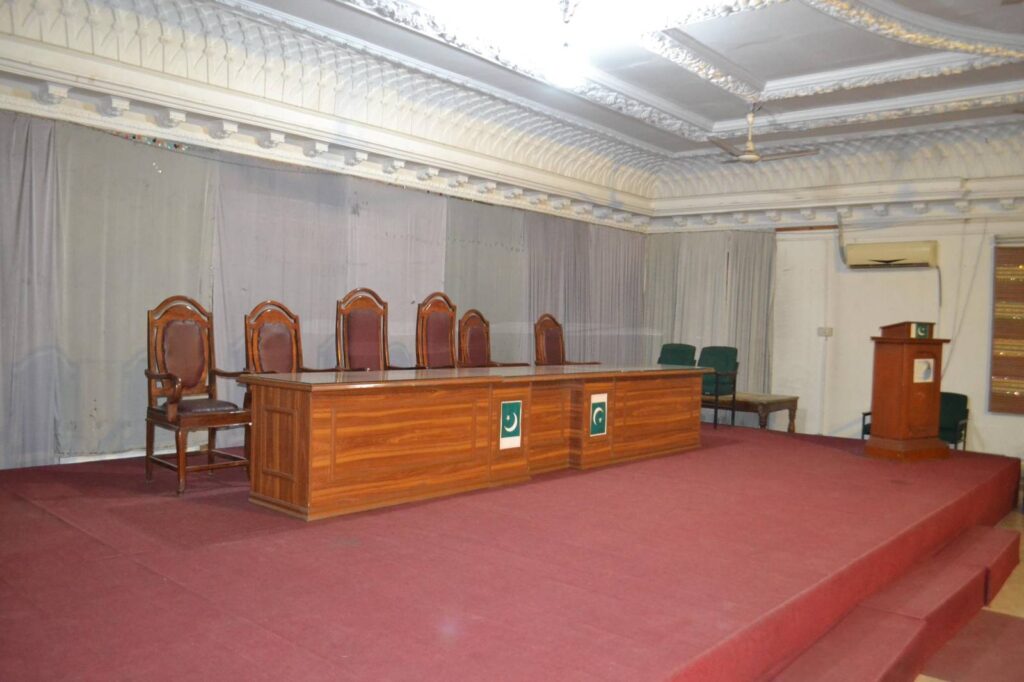
A testimony
Beirut’s newspaper, Al-Yaum, published an introductory article about Hazrat Musleh-e-Maudra, in which it stated:
وقد لعب هذا الزعيم الديني المسلم دورًا هامًا فی كشمير و فی تأسيس دولة باكستان
“This Muslim religious leader has played an important role for Kashmir and the formation of Pakistan.” (Al-Yaum, 22 December 1949)
Freedom of Tunisia and Morocco
For a long time, the Muslims of Tunisia and Morocco were striving for independence and it was announced that on 21 November 1952, the Muslims of the whole world should hold Tunisia and Morocco Day.
Hazrat Musleh-e-Maudra, expressing his love for the Muslim Ummah, instructed the Jamaat to pray and hold gatherings in favour of the oppressed Islamic countries’ independence. Foreign Minister of Pakistan, Sir Zafrulla Khan Sahibra raised his voice in the United Nations. Finally, both these countries got independence in 1956.
These were only a few of those great services for the Muslim world rendered by Hazrat Musleh-e-Maudra, which depicts his love for the Muslim Ummah and desire to see its progress and prosperity.

